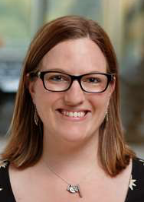From the 12/11/2020 newsletter
Perspective
“Loving Each Other Through the Darkness”
Alicia Pilarski, DO & Cassie Ferguson, MD
“My patient was
talking with me a few minutes ago and then he just coded…we tried everything we
could. Breaking the news to his family over the phone was awful.”
“I just can’t
unsee what happened to my patient. She was so badly abused and injured and I
can’t imagine what she went through…”
“I made a
mistake. I thought our patient was suffering from congestive heart failure, but
it was sepsis. I never gave antibiotics and caused further damage from giving
diuretics. I’m not sure how I can go back to work tomorrow.”
As physicians and learners, we see people suffer with protracted and difficult illnesses. We see lives instantly devastated by a new diagnosis or injury. We are asked to bear witness to the death of patients too sick to be surrounded by their own family. And then we kneel alone, face in our hands, before rising quickly to take care of the next patient. We are not taught or given the space to process these tragedies aloud.
Death, loss, and errors are inherent to the practice of medicine, yet a false sense of separation keeps us from reaching out to one another when their impact becomes too much to struggle with on our own. This sense of separation exists for many reasons, but is certainly driven by the isolating medical hierarchy, our unforgiving culture of blame and shame, and our own sense of exceptionalism; this erroneous belief that we are inherently different from one another, that we are the only one that has struggled in this way, that others have somehow handled it by themselves. Our current social situation exacerbates these issues, offering less opportunity to be physically present with our work family and making resources harder to recognize.
These
obstacles to connection fuel our unwellness. They prevent us from seeing that
our suffering is not exceptional; it is universal. We hope you know that we see
you behind that mask and know that patient’s death made you think of your own
mortality and wonder if someone in your family is next. We see you on that Zoom
call stretching every ounce of your energy and patience in order to be a mom, a
teacher, a researcher, a physician. And we see you sitting six feet away from us
in the break room struggling with that last case that shook you to your core.
We
see you. We are you.
We also know that connection is a remarkable force and have witnessed its power in our own lives. Talking openly about our struggles with one another reminds us of our humanity and wakes us up to the reality that we are not so different from one another. It is also a powerful force for healing; sharing our anxiety, grief, anger, and fear with someone who will listen empathically strips these emotions of the shame and paralysis that are often attached. And in turn, your story of how you overcame what you experienced can become “someone else’s survival guide.” (Brené Brown).
We encourage you to ask how you might tap into and add to the incredible power of our community and draw on the collective compassion of your colleagues. We want to be your first line of defense when what you’ve seen saturates your coping mechanisms. We want to be there for you like someone was there for us.
Dr.
Rana Awdish phrased it most beautifully in her book, In Shock:
“How we care for
each other during life is the true restoration—the definition of agency…Our
ability to be present with each other through our suffering is what we are
meant to do. It is what feeds us when the darkness inevitably looms. We cannot
avoid the darkness, just as we cannot evade suffering. Loving each other
through the darkness is the thing to look for and to mark. It’s there, in the
shadows, where we find meaning and purpose.”
Resources
for providers, trainees, learners, and staff:
· Our institution has several resources
and opportunities to reach out for support, both for peer support and more
advanced support.
- For a list of the current Froedtert & MCW Supporting our Staff (SOS) Peer Support team, please visit our website: https://infoscope.mcw.edu/MCP-Medical-College-Physicians/Practice-Initiatives/Peer-Support-Program.htm
- If you need immediate support, please page the SOS Team (414-314-1763) or email Dr. Alicia Pilarski (apilarski@mcw.edu) or Dr. Timothy Klatt (tklatt@mcw.edu).
Alicia
Pilarski, DO is a Associate Professor in the Department of Emergency Medicine
at MCW. She serves as the Graduate Medical Education Patient Safety and Quality
Officer. She is the Associate Chief Medical Officer at Froedtert Hospital. She
is actively involved in Wellness in the Kern Institute, MCWAH, MCW, and the
hospitals.
Cassie Ferguson, MD is an Associate Professor
of Pediatrics (Emergency Medicine) at MCW. She leads the MCW M1 and M2 REACH
curriculum focused on promoting wellness. She is the director of the Student
Pillar of the Robert D. and Patricia E. Kern Institute for the Transformation
of Medical Education.
x



